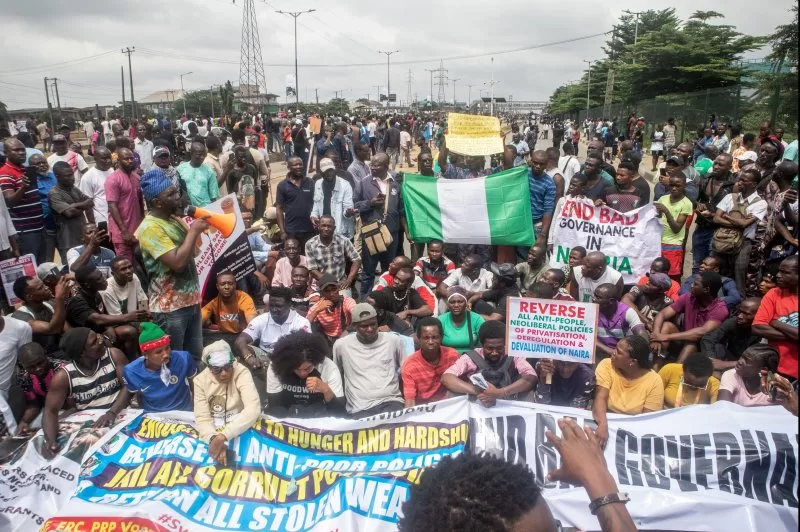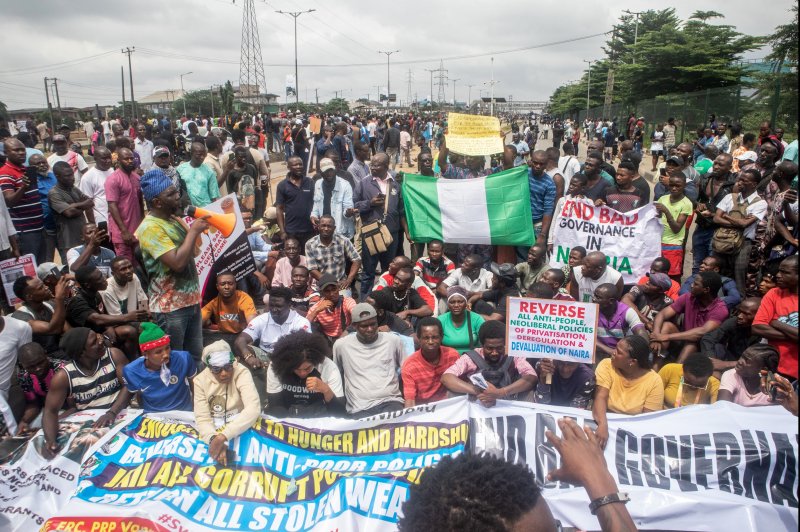Protests against hunger, high prices and mismanagement of Nigeria’s economy turned deadly with at least 13 people killed with Amnesty International accusing authorities of opening fire with live ammunition while authorities blamed “thugs” and Islamist militants for the violence. Photo by Emmanuel Adegboye/EPA-EFE
Aug. 2 (UPI) — At least 13 protestors and a police officer were killed after nationwide demonstrations in Nigeria over food shortages, high energy prices and corruption turned deadly.
Four people died and dozens were injured in a bomb blast in Borno State and hundreds were arrested amid curfews in at least two other northern states imposed after government and public buildings and facilities were targeted and looted, according to police who blamed the deaths on Boko Haram militants they alleged had infiltrated protests in Maiduguru.
The governor of the northern state of Kano, the country’s second most populous state after the Abuja Federal Capital Territory, said violence flared after “thugs” took over the protests in Kano City where four people were hospitalized after police used live fire, tear gas and water cannon spraying hot water to break up a crowd of thousands.
However, Amnesty International said the people who hijacked the protests in Kano were “hired” to undermine the right to peaceful protest.
The group said it had verified killings of another nine people — six in Suleja, just outside Abuja, and three in Kaduna 125 miles north of the capital, alleging that all 13 had died as a result of security forces “shooting indiscriminately into crowds of unarmed protestors.”
“Our findings, so far, show that security personnel at the locations where lives were lost deliberately used tactics designed to kill while dealing with gatherings of people protesting hunger and deep poverty,” the rights group’s Nigeria branch said in a post on X.
“Nigerian security agencies’ unlawful attitude of using firearms as [a] tactical tool for the management of protests must end. Authorities must investigate these incidents and ensure that security personnel suspected of responsibility for deadly use of force are held to account through fair trial.
“Violent crackdown on peaceful protesters is unjustified and unacceptable.”
The aims of the 10 days of protests include the reintroduction of gas and electricity subsidies canceled by President Bola Tinubu as one of his first acts coming into office in May 2023 as part of ambitious economic reforms in an effort to pull the country out of a deepening economic crisis.
A collapse in the value of the naira after Tinubu abandoned the peg with the dollar and rampant inflation, which topped 34% in June according to the central bank, has seen petrol prices more than triple and food prices double placing people in desperate straits a country where the monthly minimum wage is around $43.
Civic leaders called on Tinubu to act to defuse the unrest.
“This government must address the challenges of hunger and poverty, and it must also do everything possible to assure the people,” said Chief Ayo Adebanjo, head of Afenifere, a group that speaks for the country’s ethnic-Yoruba population.
Adewole Adebayo, the Social Democratic Party’s candidate who challenged Tinubu for the presidency in February 2023, urged the president to “get a grip” and take control of the situation by addressing the extreme difficulties of Nigerians caused by his administration’s policies.

